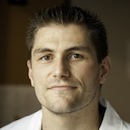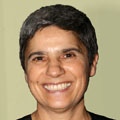Academic Editors
The following people constitute the Editorial Board of Academic Editors for PeerJ. These active academics are the Editors who seek peer reviewers, evaluate their responses, and make editorial decisions on each submission to the journal. Learn more about becoming an Editor.

Guillermo Mendez-Rebolledo
Guillermo Mendez-Rebolledo received his Doctoral Degree in Physical Activity and Sport Science from Universidad Pablo de Olavide (2020), his Master in Health Sciences and Sport from Universidad Finis Terrae (2013) and his Bachelor of Physical Therapy from Universidad de Talca (2009). His research interest is Muscle Physiology and Motor Control with a special focus on Sports Medicine and Physiotherapy. Prof. Mendez-Rebolledo currently works at the Escuela de Kinesiología, University Santo Tomás (Chile).

Monique Messié
Research specialist at the Monterey Bay Aquarium Research Institute (MBARI) working on physical/biological interactions in the oceans.
My research combines satellite products, models and in situ data to study ecosystem processes and physical/biological interactions in the coastal and open oceans. Current areas of research include physical and biological variability at regional and global scales, ecosystem response to climate and ocean change, bioluminescence in the upper ocean, marine hotspots in the California Current, connections between surface, midwater and benthic communities, and the effect of tropical islands on phytoplankton biomass and biodiversity.

Laurent Metzinger
Laurent Metzinger has completed his PhD in Biological Sciences and Pharmaceutical studies in Strasbourg, France and was a postdoctoral fellow from the University of Oxford (UK) in a leading lab on Duchenne muscular Dystrophy (Pr. Kay Davies). He works on microRNA regulation in the HEMATIM team in Amiens, and focuses on anemia and related vascular disorders associated with Chronic Kidney DIsease. He has authored some of the first papers showing a role for microRNAs in CKD and published in reputed journals, including Nature and Cell. He teaches Biochemistry, Genetics and Molecular Biology in the Pharmacy School of Amiens (Université de Picardie Jules Verne).

David Meyre
David Meyre completed a PhD in quantitative plant genetics in France. Since 2001, he has been working on the elucidation of the genetic bases of obesity and type 2 diabetes. In 2004, he published the first family-based genome-wide scans for childhood and severe adult obesity. He completed the two first successful positional cloning efforts for childhood and severe adult obesity, which identified the positional candidate genes ENPP1 and PCSK1. In 2007, he contributed to the identification of the major susceptibility gene for polygenic obesity FTO. In 2009, he published the first genome-wide association study of extreme obesity in the French population and identified four novel susceptibility-loci. In 2010, he conducted the first genome-wide association meta-analysis for early-onset extreme obesity in German and French populations. In 2012, he identified the third more common form of monogenic obesity (PCSK1 partial deficiency) and demonstrated an important role of the lipid sensor GPR120 in human obesity. He also discovered the first molecular link between obesity and major depression. In 2013, he discovered a novel gene (SIM1) responsible for a syndromic Mendelian form of childhood obesity. In 2016, he discovered that physical activity can blunt the effect of the obesity predisposing gene FTO in diverse ethnic groups. He also demonstrated that genes can predict the outcomes of different types of bariatric surgery.

Eva M Mezey
Dr. Mezey earned her M.D. from the Semmelweis University Medical School in Budapest, Hungary. She received her Ph.D. in neuroendocrinology from the Hungarian Academy of Sciences in Budapest. Dr. Mezey subsequently came to the NIH as a postdoctoral fellow in the Laboratory of Cell Biology, NIMH. She later returned to the NIH as a visiting scientist in NINDS. In 2004 she transferred to the NIDCR and heads the Adult Stem Cell Section to study the biology of bone marrow derived stem cells.

Chiyuan Miao
Chiyuan Miao is a full professor in the Faculty of Geographical Science,Beijing Normal University, China. His researches mainly focus on the soil erosion (slope scale), Eco-hydrology (watershed scale) and climate change (continent/global scale).

Fernanda Michalski
Dr. Fernanda Michalski is Associate Professor of Ecology and Conservation of Vertebrates at the Federal University of Amapá, Macapá, Brazil. Member of the British Ecological Society. Her research focuses on understanding the effects of anthropogenic disturbance on Neotropical mid sized and large-bodied vertebrates. She is particularly interested in ecology and conservation of mammals, and in understanding human-wildlife conflicts in the Brazilian Amazon.

Hope A Michelsen
Distinguished Member of the Technical Staff in the Combustion Research Facility at Sandia National Laboratories. A.B. in Chemistry from Dartmouth College, Ph.D. in Chemistry with a minor in Physics from Stanford University. Elected Fellow of the Optical Society (OSA).
My current research interests include developing and using optical and X-ray techniques for studying the chemistry of combustion-generated particles inside the combustor and their evolution after release into the atmosphere. My research experience includes gas-surface scattering experiments, atmospheric modeling, soot-formation studies, combustion-diagnostics development, atmospheric black-carbon measurements, and greenhouse-gas source attribution.

Koji Mikami
Prof. Koji Mikami is Professor of Department of Food Resource Development in School of Food Industrial Sciences at Miyagi University, Japan. He is also President of the Japanese Society of Applied Phycology. Prof. Mikami received his PhD in Plant Science from Hokkaido University in 1990. His area of expertise focuses on the physiology and molecular biology of development and environmental stress response in seaweeds, and the biotechnology of seaweeds (gene transfer and genetic transformation, application of seaweed genes for land green plants).

Alexander S Mikheyev
I am principally interested in how ecological forces shape genomic evolution. To do this I have been taking advantage of ongoing developments in sequencing technology. I try to remain on the cutting edge of this fast-moving field by developing new molecular and analytical methods for sequencing, with a particular focus on degraded DNA, such as in museum specimens. I choose study organisms for their suitability to the project at hand, and have worked on everything from microorganisms, to insects to snakes. Despite this diversity, much of my work has focused on the biology of social insects, and they remain a personal passion.

Ross H Miller
Dr. Miller is an Associate Professor in the Department of Kinesiology at the University of Maryland (College Park, MD, USA). His research focuses on the mechanics and energetics of human locomotion in health and pathology, with an emphasis on causes and prevention of knee osteoarthritis.

David S. Milstone
Assistant Professor of Pathology, Brigham and Women's Hospital and Harvard Medical School.

